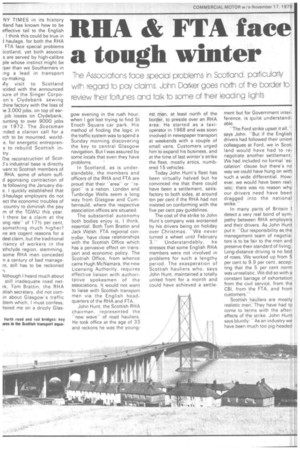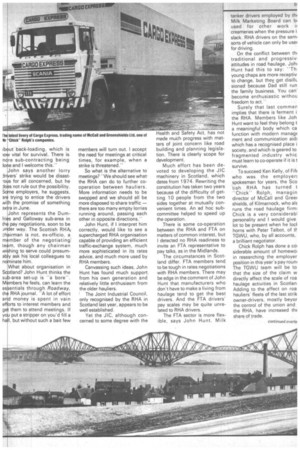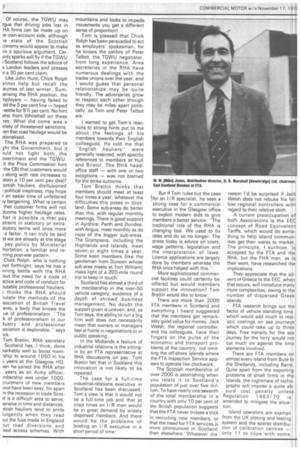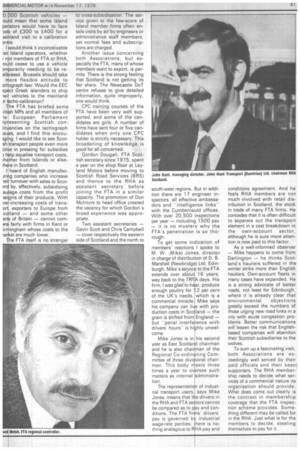RHA & FTA face a tough whiter
Page 60

Page 61

Page 62

Page 63

If you've noticed an error in this article please click here to report it so we can fix it.
The Associations face special problems in Scotland. particulatly win regard to pay claims. John Darker goes non of ne borcer to review -)eir fortunes anc talk to some of their eading ightS
NY TIMES in its history tland has known how to be effective tail to the English . I think this could be true in 3 haulage, for both the RHA FTA face special problems icotland, yet both associas are served by high-calibre pie whose instinct might be rper than we Southerners in 'rig a lead in transport cy-making.
i/ly visit to Scotland icicled with the announced sure of the Singer Corpoon's Clydebank sewing :hine factory with the loss of le 3,000 jobs, on top of earjob losses on Clydebank, Junting to over 9000 jobs e 1972. The Scotsman nded a clarion call for a rch to be mounted, worlde, for energetic entreprens to rebuild Scottish intry.
rhe reconstruction of Scot's industrial base is directly vant to Scottish members of RHA, some of whom suffd agonising contraction of ts following the January dise. I quickly established that 3-haulage employers do not ect the economic troubles of country to diminish the pay m of the TGWU this year. I. there be a claim at the )ing rateof 171/2 per cent, something much higher? ire are cogent reasons for a dest claim, but the traditional itancy of workers in the 3thclyde region, stemming, some RHA men conceded ri a century of bad managent, still has to be reckoned 1.
klthough I heard much about still inadequate road netrk, Tom Brattin, the RHA attish secretary, did not comin about Glasgow's traffic blem which, I must confess, hered me on a drizzly Gies gow evening in the rush hour, when I got lost trying to find St Enoch Square car park. His method of finding the logic in the traffic system was to spend a Sunday morning discovering the key to central Glasgow navigation. But I was assured by some locals that even they have problems.
In Scotland, as is understandable, the members and officers of the RHA and FTA are proud that their "area" or "region" is a nation. London and Tunbridge Wells seem a long way from Glasgow and Cumbernauld, where the respective association offices are situated.
The substantial autonomy both bodies enjoy is, I think, essential. Both Tom Brattin and Jack Welsh, FTA regional controller, have close relationships with the Scottish Office which has a pervasive effect on transport and economic policy. The Scottish Office, from whence came Hugh McNamara, the new Licensing Authority, requires effective liaison with authoritative spokesmen of the associations. It would not want to liaise with Scottish transport men via the English headquarters of the RHA and FTA.
John Hunt, the Scottish RHA chairman, represented the "new wave" of road hauliers. He took office at the age of 33 and reckons he was the young
est man, at least north of the border, to preside over an RHA area. He started as a taxioperator in 1968 and was soon involved in newspaper transport at weekends with a couple of small vans. Customers urged him to expand his business, and at the time of last winter's strike the fleet, mostly artics, numbered 15 vehicles.
Today 'John Hunt's fleet has been virtually halved but he convinced me that there could have been a settlement, satisfactory to both sides, at around ten per cent if the RHA had not insisted on conforming with the five per cent pay guidelines.
The cost of the strike to John Hunt's company was worsened by his drivers being on holiday over Christmas. "We never turned a wheel until February 3." Understandably, he stresses that some English RHA members were not involved in problems for such a lengthy period. The exasperation of Scottish hauliers who, says John Hunt, maintained a totally united front for a month and could have achieved a settle-.
ment but for Government interference, is quite understandable.
"The Ford strike upset it all," says John. "But if the English drivers had followed their union colleagues at Ford, we in Scotland would have had to renegotiate another settlement. We had included no formal 'escalation' clause but there's no way we could have hung on with such a wide differential. However, we would have been realistic: there was no reason why our drivers need have been dragged into the national strike.''
In many parts of Britain I detect a very real bond of sympathy between RHA employers and their drivers. As John Hunt put it: "Our responsibility as the management team of negotiators is to be fair to the men and preserve their standard of living. Long-distance driving is no bed of roses. We worked up from 5 per cent to 9.9 per cent, accepting that the 5 per cent norm was unrealistic. We did so with a constant barrage of exhortation . from the civil service, from the CBI, from the FTA, and from customers."
Scottish hauliers are mostly, realistic men: They have had to come to terms with the aftereffects of the strike. John Hunt says bluntly: '' As an industry we have been much too pig-headed :bout back-loading, which is low vital for survival. There is nore sub-contracting being lone and I welcome this.
John says another lorry drivers' strike would be disast'MIS for all concerned, but he does not rule out the possibility. some employers, he suggests, are trying to entice the drivers Nith the promise of something ?Atm in June.
John represents the Dumfries and Galloway sub-area in the pay negotiations, soon to be under way. The Scottish RHAr chairman is not, ex-officio, a member of the negotiating. teem, though any chairman Nishing to serve could presumably ask his local colleagues to nominate him.
What about organisation in Scotland? John Hunt thinks the sub-area set-up is "a bore'. Members he feels, can learn the essentials through Roadway, the RHA journal. 'A lot of effort and money is spent in vain efforts to interest members and get them to attend meetings. If you put a stripper on you'd fill a ha I, but without such a bait few members will turn out. I accept the need for meetings at critical times, for example, when a strike is threatened."'
So what is the alternative to meetings? "We should see what the RHA can do to further cooperation between hauliers. More information needs to be swopped and we should all be more disposed to share traffic — there are too many empty lorries running around, passing each other in opposite directions.
John Hunt, if I interpret him correctly, would like to see a supercharged RHA organisation capable of providing an efficient traffic-exchange system, much more sophisticated in its rates advice, and much more used by RHA members.
Canvassing such ideas, John Hunt has found much support from his own generation and relatively little enthusiasm from the older hauliers.
The Joint Industrial Council, only recognised by the RHA in Scotland last year, appears to be well established.
Yet the JIC, although concerned to some degree with the Health and Safety Act, has not made much progress with matters of joint concern like road building and planning legislation. There is clearly scope for development.
Much effort has been devoted to developing the JIC machinery in Scotland, which dates from 1974. Rewriting the constitution has taken two years because of the difficulty of getting 10 people from the two sides together at mutually convenient times. An ad hoc subcommittee helped to speed up the operation.
There is some co-operation between the RHA and FTA on matters of common interest, but I detected no RHA readiness to invite an FTA representative to pay talks, as in the Midlands.
The circumstances in Scotland differ. FTA members tend to be tough in rates negotiations with RHA members. There may be edge in the comment of John Hunt that manufacturers who don't have to make a living from haulage tend to get the best drivers. And the FTA drivers' pay scales may be quite unrelated to RHA drivers.
The FTA sector is more flexible, says John Hunt. Milk tanker drivers employed by thr Milk Marketing Board can br used for other work ir creameries when the pressure i slack. RHA drivers on the sami sorts of vehicle can only be use for driving.
On the conflict between th, traditional and progressiv, attitudes in road haulage, Joh: Hunt had this to say: "Th, young chaps are more receptiv to change, but they get disill. sioned because Dad still run the family business. You can' become enthusiastic withou freedom to act."
Surely that last commen implies that there is ferment i the RNA_ Members like Joh Hunt want to feel they belong t a meaningful body which ca function with modern manage ment and communication aids which has a recognised place i society, and which is geared to fragmented industry whic must learn to co-operate if it is t survive.
To succeed Ken Kelly, of Fife who was the employert spokesman for years, the Sco tish RHA has turned t "Chick" Rolph, managin director of McCall and Greer shields, of Kilmarnock, who alt runs the road haulage firm: Chick is a very considerabl personality and I would give lot to be present when he locl, horns with Peter Talbot, of if TGWU, who, by all accounts, a brilliant negotiator.
Chick Ralph has done a col siderable amount of homewo: in researching the employer position in this year's pay rouni The TGWU team will be to that the size of the claim w directly affect the scale of roa
haulage activities in Scotian, Adding to the affect on roa
hauliers' fleets of the last strik owner-drivers, mostly beyor the control of the union and the RHA, have increased thE share of trade.
Of course, the TGWU may rgue that driving jobs lost in HA firms can be made up on le own-account side, although le state of the Scottish onomy would appear to make is a spurious argument. Ceriinly sparks will fly if the TGWU Scotland follows the advice of 3 London leaders and presses ir a 30 per cent claim.
Like John Hunt, Chick Rolph 3nnot help but recall the aumas of last winter. Sumarising the RHA position, the nployers — having failed to 31d the 5 per cent line — hoped settle for 81/2 per cent. No hint ime from Whitehall on these les. What did come was a iriety of threatened sanctions, fen that road haulage would be The RHA was prepared to 3ht the Government, but it )uld not fight both the overnment and the TGWU. d the Price Commission hint the CBI that customers would ) along with rate increases to Istain a 10 per cent pay deal? :ottish hauliers, disillusioned , political ineptness, may hope r an easier time of unfettered iy bargaining. What is certain that customer firms will not 3Icome higher haulage rates. hat is possible is that pay straint in statutory or extraltutory terms will once more a factor. it can truly be said at we are already at the stage pay policy by Ministerial hortation; a familiar and rerring post-war pattern.
Chick Rolph, who is nothing not forthright, says he has a nning battle with the RHA out the need for a code of 3ctice and code of conduct for mtable professional hauliers. ) thinks the RHA should iulate the methods of the sociation of British Travel ents, a body that knows the ue of professionalism. "The :k of professionalism in our lustry and professional ;ociation is deplorable," says ick.
Tom Brattin, RHA secretary Scotland has, I think, done narkably well to boost mem-ship to around 1050 in his 2 years at the Glasgow HQ. len he joined the RHA after
years as an Army officer, mbership was under 1000. cruitment of new members mot have been easy, for apart m the recession in trade Scotd is a difficult area to serve, )ensive in time and distances. Atish hauliers tend to smile lulgently when they read mit the fuss made in England )ut road diversions and ited access schemes. With mountains and locks to impede movements you get a different sense of proportion!
Tom is pleased that Chick Ralph has been persuaded to act as employers" spokesman, for he knows the calibre of Peter Talbot, the TGWU negotiator, from long experience. Area secretaries in the RHA have numerous dealings with the trades unions over the year, and I would guess that personal relationships may be quite friendly. The adversaries grow to respect each other though they may be miles apart politically, as Tom and Peter Talbot are, I wanted to get Tom's reactions to strong hints put to me about the feelings of his members towards their English colleagues. He told me that "English hauliers"' were generally resented, with specific references to members at Hull and Bristol. The RHA headoffice staff — with one or two exceptions — was not blamed for the strike outcome.
Tom Brattin thinks that members should meet at least four times a year, whatever the difficulties this poses in Scotland. Some sub-areas do better than this, with regular monthly meetings. There is good support in Ayrshire; Perth and Dundee, with Angus, meet monthly as do most of the bigger sub-areas. The Grampians, including the Highlands and Islands, meet. seven or eight times a year., Some keen members (like the gentleman from Dunoon whose sub-area meets at Fort William) make light of a .20-mile round trip to keep in touch.
Scotland has almost a third of its membership in the over-50 vehicle category; evidence of a depth of shrewd business management. No doubt the support given is uneven, and, as Tom says, the ability to run a big firm well does not necessarily mean that owners or managers feel at home in negotiations or in public speaking.
In the Midlands a feature of industrial relations is the sittingin by an FTA representative at RHA discussions on pay. Tom Brattin felt that in Scotland this innovation is not likely to be repeated.
The case for a full-time industrial-relations executive in Scotland has been discussed. Tom's view is that it would not be a full-time job and that at crisis times an I/R man would be in great demand by widely dispersed members. And there would be the problems of briefing an I/R executive in a short period of time. , But if Tom rules out the case for an I/R specialist, he sees a strong case for a commercial executive in the Glasgow office to exploit modern aids to give members a better service. "The traditional role of the RHA is changing fast. We used to fix rates and do so no longer. The stress today is advice on costs, wage patterns, legislation and the interpretation of laws. Licence applications are largely done by members whereas the RHA once helped with this."
More sophisticated commercial facilities could certainly be: offered but would members support the innovation? Tom Brattin would like to know.
There are more than 2000 FTA members in Scotland and everything I heard suggested that the members get remarkably good value for money. Jack Welsh, the regional controller, and his colleagues, have their fingers on the pulse of the economic and transport problems of the country, not omitting the off-shore islands where the FTA Inspection Service appears to operate like clockwork.
The Scottish membership of over 2000 is astonishing when you relate it to Scotland's population of just over-five million. To have nearly one seventh of the total membership in a country with only 10 per cent of the British population suggests that the FTA never misses a trick in recruiting new members; or that the need for FTA services is more pronounced in Scotland than elsewhere. Whatever the
reason I'd be surprised if Jack Welsh does not rebuke his fellow regional controllers with regard to their relative sloth.
A current preoccupation of both Associations is the EEC concept of Road Equivalent Tariffs, which would do something to help island communities get their wares to market. The principle, I surmise, is accepted by the FTA and the RHA, but the FHA men, as is their wont, have researched the implications.
They appreciate that the advent of Greece to the EEC, when that occurs, will introduce many more complexities, owing to the number of dispersed Greek islands.
FTA research brings out the factor of vehicle standing time, which would add much to realistic costings on sea journeys which could take up to three days. Free transits for the sea journey for the lorry would not cut much ice against the time elements involved.
There are FTA members on almost every island from Bute to the Shetlands, including Barra. Quite apart from the exporting problems of small firms in the Islands, the nightmare of tachographs will impose a quite absurd cost penalty unless Regulation 1463/70 is amended to mitigate the situa tion.
Island operators are exempt from the UK plating and testing system and the sparse distribution of calibration centres — only 11 to cope with some 0, 00 Scottish vehicles Id mean that some Island pe ators would have to face )s of £300 to £400 for a lai land visit to a calibration an re.
I ould think it inconceivable tat Island operators, whether r n t members of FTA or RHA, ro Id cease to use a vehicle m.orariIy needing to be reall rated. Brussels should take ore flexible attitude to ic ograph law. Would the EEC ct Greek islanders to ship 'lei vehicles to the mainland )r acho-calibration?
he FTA has briefed some it -h MPs and all members of -le European Parliament esenting Scottish contit encies on the tachograph
is es, and I find this encou agi g. I would like to see Scotsh transport people even more cti e in pressing for subsidies h-ip equalise transport costs, eh ther from Islands or elserh re in Scotland.
I heard of English manufaciri g companies who increase lei turnover with sales to Scot in by, effectively, subsidising aulage costs from the profit la ins of their products. With ye -increasing costs of transo exporters to Europe from tland — and some other a of Britain — cannot com et fairly with firms in Kent or ijr Ingham whose costs to the ket are much lower.
he FTA itself is no stranger to cross-subsidisation. The service given to the few-score of Island member firms often entails visits by air by engineers or administrative staff members, yet normal fees and subscriptions are charged.
Another issue concerning both Associations, but especially the FTA, many of whose members want to export, is permits. There is the strong feeling that Scotland is not getting its fair share. The Newcastle DoT centre refuses to give detailed information, quite improperly, one would think.
CPC training courses of the FTA have been very well supported, and some of the candidates are girls. A number of firms have sent four or five candidates when only one CPC holder is strictly necessary. This broadening of knowledge is good for all concerned.
Gordon Dougall, FTA Scot tish secretary since 1975,. spent a year on the shop floor at Leyland Motors before moving to Scottish Road Services (BRS) and thence to the RHA as assistant secretary before joining the FTA in a similar capacity. The promotion of Don McIntyre to head office created the vacancy for which Gordon's broad experience was appropriate.
Two assistant secretaries — Gavin Scott and Chris Campbell — cover respectively the eastern side of Scotland and the north to
south-west regions. But in addition there are 17 engineer inspectors, all effective ambassadors and -intelligence links" with the Cumbernauid offices. With over 20,500 inspections per year — including 1500 psv — it is no mystery why the FTA's penetration is so thorough.
To get some indication of members' reactions I spoke to M. W. i,Mike) Jones, director in charge of distribution of D. B. Marshall (Newbridge) Ltd, Edinburgh. Mike's Setyice to the FTA extends over about 16 years-, way back to the -FRIA days. His firm, I was glad to hear. produce enough poultry for 1 2 per cent of the UK's needs, which is a commercial miracle. Mike says his company can live with production costs in Scotland — the grain is shifted from England — but "penal interference with drivers' hours" is highly unwelcome.
Mike Jones is in his second. year as East Scotland chairman and he is also chairman of the Regional Co-ordinating Committee of three divisional chairmen. This body meets three times a year to oversee such matters as internal administration.
The representation of industrial transport users, says Mike Jones, means that the drivers in the RHA and FTA sectors cannot be compared as to pay and conditions. The FTA firms' drivers' pay is governed by industrial wage-rate parities; there is nothing analagous to RHA pay and conditions agreement. And he feels RHA members are not much involved with retail distribution in Scotland, the stock in trade of many FTA firms. He concedes that it is often difficult to separate out the transport element in a cost breakdown in the own-account sector, although he is sure more attention is now paid to this factor.
As a well-informed observer — Mike happens to come from Darlington — he thinks Scotland's hauliers suffered in the winter strike more than English hauliers. Own-account fleets in many cases have expanded. He is a strong advocate of better roads, not least for Edinburgh, where it is already clear that 'environmental objections greatly exceed the numbers of those urging new road links in a city with acute congestion problems. Better communications will lessen the risk that Englishbased companies will abandon their Scottish subsidiaries to the • wolves.
To sum up a fascinating visit, both Associations are exceedingly well served by their paid officials and their keeni supporters. The RHA member-' ship needs to decide what services of a commercial nature its organisation should provide. What does come out clearly is the contrast in membership coverage that the FTA inspection scheme provides. Something different may be called for in the RHA. Just what is for the members to decide, steeling themselves to pay for it.




























































































































































